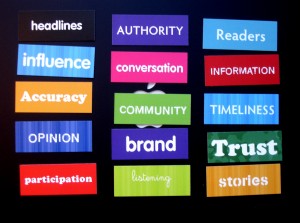In this week’s readings, Manovick describes the internet as a database with no beginning, middle and end. Databases store data that is utilised in the digital space for organisation and ease of retrieval via search engines.
I tend to agree that the internet in itself does not follow traditional narrative structure as a book would. The internet does not follow a story. It is made up of a collection of various websites, that contain their own stories and narratives within.
Databases stored in print form, such as encyclopaedias, still have a narrative structure, as they are arranged for example alphabetically by topic. This can be true to the internet too, as stories within the overall database are arranged in their own narrative sequence. It may not be the overall internet that is a narrative, but there are narratives within the big database.
So as most people know, I am a crazy book lover/nerd/enthusiast, whatever you want to call me. Last night I had the privilege of going to a roadshow held by a book supplier to see what new titles are coming out for Christmas to sell to my customers. And more importantly, which of these new titles I want to read!
Little did I know I got to leave with a special surprise. A special surprise worth over $100. Let’s just say I will be eagerly watching my mailbox over the coming months.


All rights reserved: Nathan Penlington
In the reading this week from David Shiels, he talks about how narrative is a collage, as parts of the story are stuck together to make a narrative. The parts of this narrative do not necessarily make sense on their own, but together form a meaning.
This made me think of the choose your own adventure books I read as a child. As a whole, narrative makes sense as the pieces that you choose to read form a story. Although on their own, the pieces with no context and no story are complete nonsense.
I liked the imagery that Shiels used to describe a mosaic piece. A mosaic piece is formed together by broken tiles and gives new meaning to the original object/s. I might have to consider narrative in a new light now.

All rights reserved: Steve Bridger
This week Stephanie spoke in her blog about how her younger sister has become network literate, purely through self-learning off YouTube. It made me think about how Generation Y have come to learn about network literacies where a lot of other generations get left behind. Take my Mum for example. The other night my Mum insisted I show her how to ‘check-in’ on Facebook. I was baffled at how she did not know how to do this. It’s not like myself and all of my friends had learnt how to ‘check-in’ on Facebook. This was implicit knowledge that we just… knew. So why was it so hard for my Mum and my other family members to grasp? Do they not have the same underlining curiosity that the ‘younger’ generation do with technology? Will I one day be as tech illiterate as my parents? These are all questions I think of on a regular basis.
I did have a laugh at Maddison’s blog post regarding coding and the HTML test that I just completed. Now that she mentions it, all I can think of when I think about coding is Mark Zuckerberg and The Social Network, geeks and uni students locked up in their bedrooms with servers and writing code. P.S The Accidental Billionaire (the book the film is based on) is awesome.
Brady’s blog post with pictures of Lego mini-figures represented as websites, is not only cute but hilarious! The Google one definitely gave me a laugh.

All rights reserved: Asheboro Public Library
Adrian raised a point in the lecture today about authors. He stated that authors are not actually considered authors unless they are published. More specifically, he suggested that being published meant having writing featured in print form. He then went on to say that anyone who is not published however has written something, is a wannabe writer and author and nothing more. Although I strongly disagree.
With the new technologies that have allowed for network literacy to be established, there have been new forms and ways that writing can be published. Websites have allowed for authors to publish their work online, blogs allow for new authors and writers to express their thoughts and even Facebook and Twitter have allowed for ordinary people to publish their writing online.
Network literacy and the creation of the online world has enabled a different kind of expression and a new way to get work published. It allows for writers and authors to self-publish online, and in some cases this has lead to being published in print. Print phenomenon Fifty Shades of Grey was initially published by E.L James online, and then printed after the traction it had online.
Bottom line, there is more to publishing than simply having your writing in a book. In a world that is increasingly becoming more network literate, it is essential to consider publishing beyond print.



